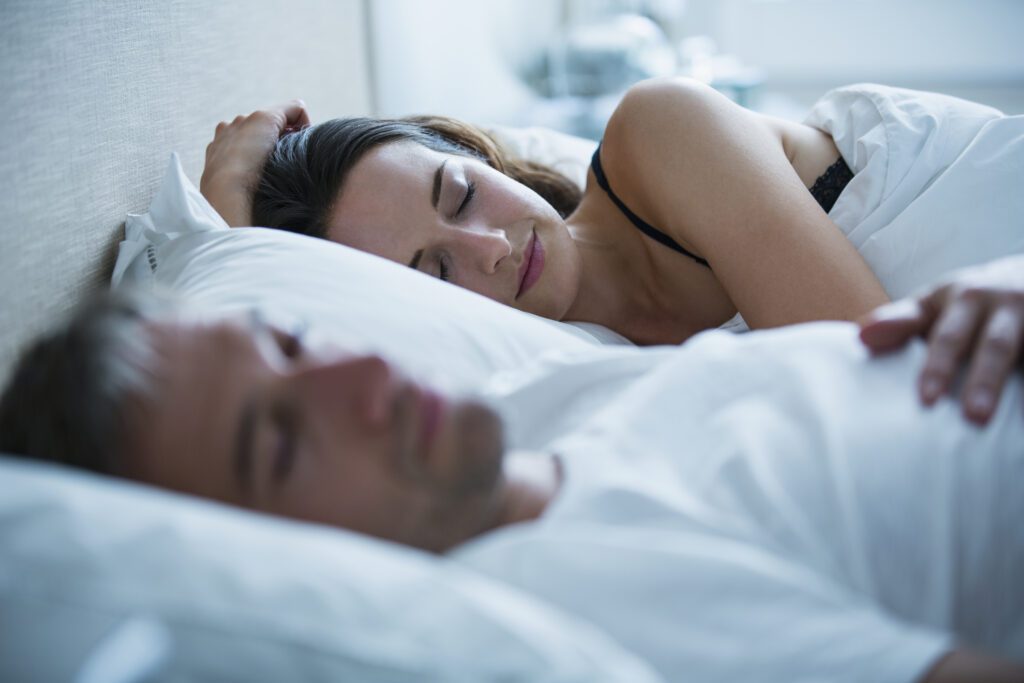Do you snore? Do you often feel more tired when you wake up than when you went to sleep? You could be at risk of developing sleep apnea.
Obstructive Sleep Apnea is the most common type of sleep apnea, which occurs when the airway becomes momentarily blocked, cutting the flow of oxygen off to the vital organs. The airway becomes blocked when the soft tissues in the mouth relax and collapse towards the back of the throat.
The involuntary movement of the soft tissues can repeatedly close the airway during sleep, causing breathing and heart problems. However, Dr. Joseph A. Catanzano III, DDS, treats sleep apnea in Washington, D.C. This dental concern is easily treatable with oral appliances.

Symptoms of Sleep Apnea
Many common symptoms often accompany sleep apnea:
- Dry mouth
- Irritability
- Difficulty concentrating
- Consistent, loud snoring
- Waking up to breathe
- Headaches that arise in the morning
- Feeling excessively tired during the day
- Sleeping with an open mouth
Anyone can be diagnosed with sleep apnea. However, some groups are more prone to the condition:
- Men over the age of 40
- Patients who have a large neck circumference
- Those who are overweight
- Diabetic patients
- Patients with high blood pressure
- Those with a genetic predisposition
These symptoms and risk factors are important to keep in mind. If you notice any signs of sleep apnea, call Foxhall Smiles for treatment.
The Dangers of Untreated Sleep Apnea
Sleep apnea is absolutely something to contact us about right away if you notice symptoms. Untreated sleep apnea can lead to various health problems and even put you at risk for death. It impacts both your physical and mental health negatively.
Mental Impacts
When you’re constantly waking up overnight — whether you notice it or not — you’re not getting enough sleep. Deep sleep is essential for your cognitive function. It can impact how well you’re able to retain new memories. You also have trouble concentrating and are extremely tired throughout the day. This can impact your performance at work or school and be dangerous when driving. You’re at higher risk of falling asleep at the wheel.
Untreated sleep apnea has a link to various mood disorders like depression and anxiety. Chronic sleep deprivation messes with the chemicals in your brain, which puts you more and more at risk of developing mood disorders. This is combined with the fact that you’re sleep-deprived, which already causes you to be irritable and depressed. Sleep apnea continues to worsen these various effects.
Physical Problems
One of the biggest worries with untreated sleep apnea is how it impacts the cardiovascular system. With repetitive breathing disruption, there isn’t enough oxygen in your blood, causing stress in your vascular system. The more stress the vascular system is under, the more likely you are to have problems with high blood pressure, heart attacks, and strokes. The frequent breathing and sleep disruption also may make changes in your heart’s rhythm, increasing the chances of severe issues further.
Sleep apnea also disrupts the hormones that regulate your hunger and weight. Your appetite increases, and you have more cravings for unhealthy foods that are high in sugar and calories. This puts you at a higher risk for obesity and type 2 diabetes. If you reach the obesity level, that then worsens your sleep apnea. It creates a cycle that’s hard to dig out of without proper treatment.
There are various other problems associated with untreated sleep apnea. These include issues with the liver, an increased risk of problems when you’re under anesthesia or getting surgery, and more. And this doesn’t include the impacts it has on other people. Your partner or roommate may suffer because they may wake up due to your snoring. You’re more irritable, making you less pleasant to cohabitate with. And you’re at a higher risk for things like vehicle accidents possibly harming other people.
Treating Sleep Apnea
Oral appliance therapy is a good option for patients with mild to moderate sleep apnea. An oral appliance is similar to a mouthguard, customized to fit each patient. This solution opens the airways and prevents the soft tissue in the back of the throat from collapsing.
The appliance is worn during sleep to help reposition the jaw. Oral appliance therapy helps patients get a full night of sleep. Dr. Catanzano will assess your teeth and gums before treatment to determine if oral appliance therapy is right for you.
In addition to treating sleep apnea, Dr. Catanzano provides restorative dentistry services in Washington, D.C.
Sleep Apnea FAQs
How long can sleep apnea go untreated?
Obstructive sleep apnea can reduce your life expectancy by 12 to 15 years if left untreated. OSA does not have a permanent cure. However, diagnosis and therapy can reduce its complications.
Does your heart stop when you have sleep apnea?
Research leads to the idea that sleep apnea produces aberrant heart rhythms, which may result in premature cardiac death. Sleep apnea can put the heart under mechanical stress since it can drop oxygen levels, triggering the fight-or-flight response and changing the pressure in the chest when the upper airway closes.
What is the best position for someone with sleep apnea to sleep?
The optimal position for those with sleep apnea is on their side, with their backs mostly straight. Also, research shows that sleeping on your left side lowers your risk of sleep apnea even more than sleeping on your right.
Does stress cause apnea?
While we sleep, the muscles in the throat relax, which may obstruct airways, causing sleep apnea. Although it is not a direct cause of sleep apnea, stress can also worsen some of the symptoms of obstructive sleep apnea.
Schedule a Sleep Apnea Exam & Consultation
Sleep apnea treatment can be painless and very effective at the dentist office. Call Foxhall Smiles for sleep apnea treatment at 202-315-2188. Request an appointment online anytime, and our dental care team will get back to you promptly.
